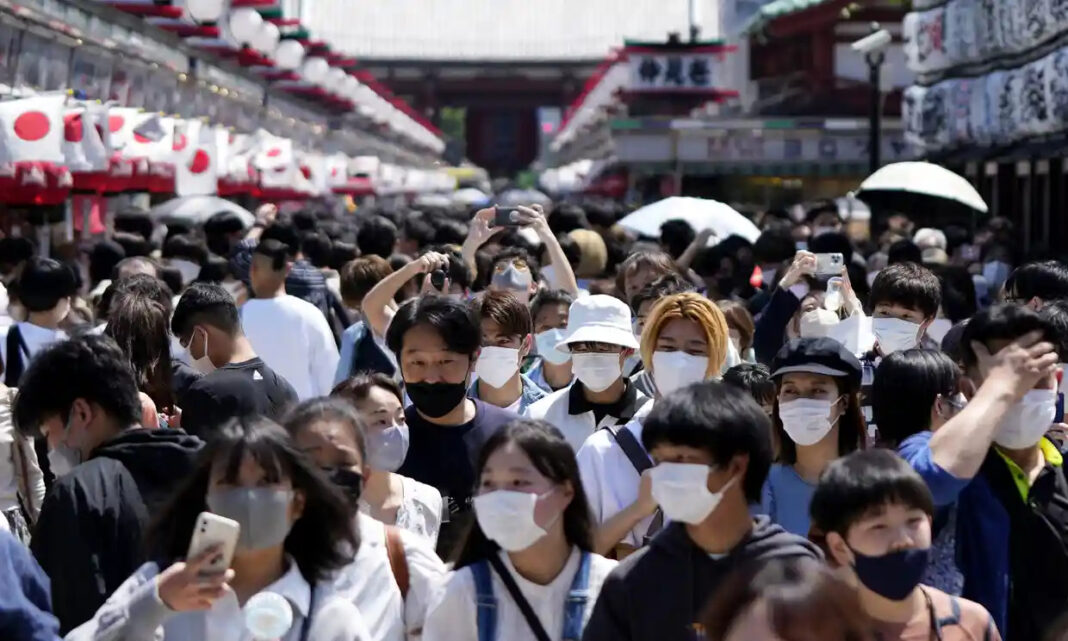For more than two years, the people of Japan and South Korea have been united by their embrace of little white rectangles. While the US and countries in Europe debated the efficacy of masks at the start of the Covid-19 pandemic, Japanese and South Koreans quickly covered up, uncomplainingly and with few exceptions, reported by theguardian.com
Explanations for the wildly contrasting coronavirus death tolls in developed countries are many and varied, but in north-east Asia – more than anywhere else – mask-wearing has been at the forefront of the public health response to the virus.
According to a survey by Nippon Information, more than 50% of respondents wanted to continue using masks, with 22% saying they would wear theirs “all the time”. Only 13.5% said they wanted to cast them off altogether.
Misae Minami only removes hers during her morning runs, when there are few people around. “I always keep my mask on outdoors if there are people within 2 metres of me,” said Minami, a teacher in Osaka, adding that she had no plans to change her behaviour. “We still feel a lot of pressure to wear masks, and as a teacher I always have to tell my students to keep theirs on. I have to be a role model.”
Kim Ki-kyung, an office worker in Seoul, said he barely noticed his mask, given that it had been an essential accoutrement for so long. “Also, I don’t need to think about grooming or my facial expressions, and it helps protect against pollution such as fine dust. And you have to wear one when you go indoors, so it’s annoying to take it on and off.”
While Japan has a tiny anti-mask movement, peer pressure to stay covered up could be overwhelming, said Yuki Nakagome, a Tokyo-based writer who has started lowering his mask on warm days when no one else is around. “There is a certain pressure to keep wearing masks that may be peculiar to Japanese society, and I don’t see that pressure moving in the opposite direction,” he said. “No one wants to be the first person to remove their mask.”
But with cases stabilising in Japan and South Korea, are people now willing to live without their masks?
This month, South Korea, which has recorded 23,606 Covid-19 deaths in its population of 52 million, ended a requirement for masks to be worn outdoors – except for gatherings of 50 or more people – but kept the mandate for indoors and public transport.
Choi Il-woo, a Seoul office worker, said he had enjoyed removing his mask last week. “With summer approaching, it feels so nice to finally be able to take off my mask when I go for a walk,” he said. “But there are still a lot of people wearing masks on the streets, so I think we still have to be careful.”
Government officials cited a downward trend in daily cases of Covid-19 after its most recent wave, driven by the Omicron variant, peaked in mid-March.
In Japan, where just over 30,000 people have died from the virus, the imminent arrival of a long, humid summer and the increased risk of heatstroke prompted some experts and officials to call for an end to advice to wear face coverings outdoors.
“We recommend that people take off their masks outside as long as sufficient distance is maintained, especially when temperatures and humidity are high,” said Hirokazu Matsuno, the chief cabinet secretary.
Despite the wide acceptance of face coverings in Japan, some have voiced frustration that, more than two years into the pandemic, there are few signs of a return to a largely maskless existence, even as restrictions are eased or abandoned in other countries.
Akino Yoshihara, an interpreter living in Kyoto, said she would feel “much more comfortable” without a mask but would continue to wear hers to prevent the spread of the virus. “Even if the government encourages us to remove our masks, I’m sure many people would still wear them,” she said.
Toshio Nakagawa, president of the Japan Medical Association, suggested face coverings could remain the norm for the foreseeable future. “I believe that the day people can stop wearing masks will never come in Japan so long as the country continues seeing coronavirus cases,” he said.
Japan’s government recommends face coverings at schools and workplaces and in other settings with large numbers of people, and encourages them to avoid the “three Cs” – close-contact settings, closed spaces and crowded places.
The country has depended on high levels of public acceptance for mask-wearing and other anti-virus measures, since its government does not have the legal power to impose lockdowns or make face coverings mandatory.
In a country where mask-wearing is common during the flu and hay fever seasons, few complained about continuing the habit throughout the pandemic. And with summer approaching, there are few signs that people are ready to abandon their masks, however uncomfortable they may be at the hottest time of the year.





















